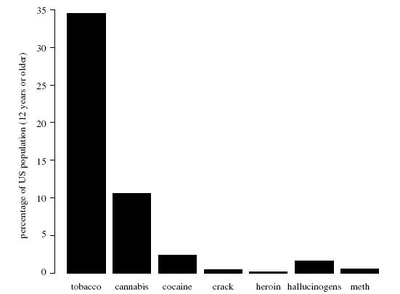April 16, 2008 feature
Researchers stumped by drug addiction paradox

From chocolate and caffeine to nicotine and cocaine, many of our most addictive foods and drugs come from plant toxins. Considering that plants originally developed these toxins to deter herbivorous predators, it’s ironic that humans and other mammals don’t merely tolerate the toxins, but can crave them and even develop dependencies on them.
This paradox, presented by researchers in a new paper in Proceedings of the Royal Society B, works both ways: supposedly, the plants should never have developed toxins that reward animals for eating them, and humans should never have developed a reward mechanism for toxic plants.
In their study, Roger Sullivan from California State University and the UC Davis School of Medicine, Edward Hagen from Washington State University, and Peter Hammerstein from Humboldt University in Berlin suggest that the most widely accepted evolutionary explanation of human drug reward might not be on the right track, and that the origins of drug addiction may be even more complicated than previously thought.
“The greatest significance of the paper is in defining the paradox, and laying out the arguments in a manner that shows that it is a real conundrum and not a straw man argument,” Sullivan told PhysOrg.com. “The paradox has deep implications for current drug reward theory because it implicitly suggests that many of the key assumptions in current drug reward theory are flawed.”
Throughout history, plants have created their toxins by mimicking their own molecules that regulate metabolism, growth and reproduction. When ingested by herbivores, some of these molecules can interfere with nearly every step in the animal’s neural signaling process.
In current evolutionary interpretations of drug addiction, these toxic substances trigger the brain’s reward center by rewiring the brain’s natural reward circuits, and falsely indicating a fitness benefit and blocking painful feelings. But, as Sullivan, Hagen, and Hammerstein show, this explanation makes several assumptions that contradict evidence from previous studies. Most significantly, it assumes that humans evolved in environments without exposure to drugs, and that the brain never evolved to protect itself from plant toxins.
However, the researchers point to several other studies which show that the detoxification enzymes developed by animals (and which originally evolved in bacteria about 3.5 billion years ago) expanded in animals about 400 million years ago – about the same time that plants were evolving their own toxins. In other words, animals and plants seemed to have coevolved competitive genes in response to each other, which contradicts the evolutionary interpretation.
As the researchers investigated further, they compiled other studies showing evidence that humans inherited these detox genes from their mammalian ancestors. Interestingly, although many modern animal species can tolerate plant toxins, different species possess different detox function levels. Even among humans from different geographic locations, these functions differ. Often, human populations with greater numbers of toxin-metabolizing genes originate from parts of the world that contain an abundance of those plants. For example, human populations in and near Turkey have a very high frequency of enzymes that can metabolize opiates, and the opiate poppy is native to the Turkish region.
To conclude their argument against the evolutionary interpretation, the researchers explain that (pre-human) animals and plants did appear to have evolved the relevant genes simultaneously. If that’s the case, then the brain shouldn’t treat drugs as if they contained a fitness benefit, giving strong support to the paradox.
“We have been surprised by how robust the paradox is – that is, in presenting the arguments at scientific meetings for several years now, no one has been able to refute the basic argument that plant ecological models and neurobiological models of drug use are in direct conflict,” Sullivan said.
Many more questions also remain unanswered, but they may contain clues to an explanation. For example, there is contradictory evidence for whether commonly used drugs have become more or less potent as they’ve been domesticated. Also, as the researchers point out, current models explaining drug reward mechanisms don’t differentiate between different drugs – even though the pathways taken by opiates, cannabis, or any other drug are vastly different. Models of multiple-drug pathways might better explain drug appeal, the scientists suggest.
Based on evidence from previous studies, Sullivan, Hagen, and Hammerstein note that plant toxins may actually have some kind of benefit for animals. For instance, because plant toxins are more harmful to some species than to others, the less affected species might actually consume levels of toxin that are tolerable to themselves but much worse for the parasites or pathogens that feed on them in order to protect themselves. For example, earlier humans that consumed nicotine (in much smaller amounts than today) could have received the benefit of fewer parasitic infections. Of course, the benefits also come with trade-offs.
“The main implications for future research are that neurobiological theorists must consider facts emerging from plant ecology,” Sullivan said. “We are also planning field studies looking for relationships between human drug use and protection from helminth parasites.”
More information: Sullivan, Roger J.; Hagen, Edward H.; and Hammerstein, Peter. “Revealing the paradox of drug reward in human evolution.” Proc. R. Soc. B. doi:10.1098/rspb.2007.1673. (journals.royalsociety.org/cont … nt/ql240r18116x5870/)
Copyright 2008 PhysOrg.com.
All rights reserved. This material may not be published, broadcast, rewritten or redistributed in whole or part without the express written permission of PhysOrg.com.





















